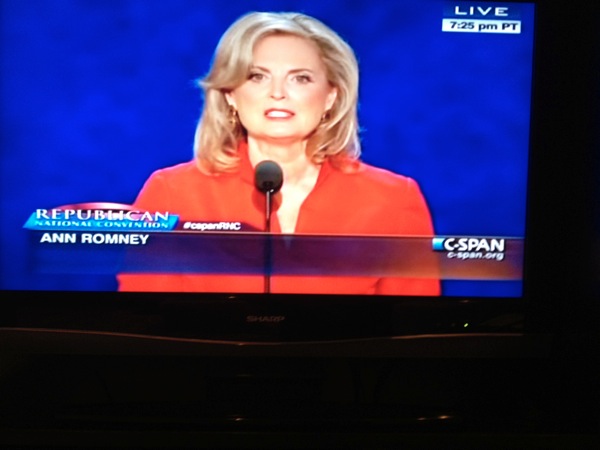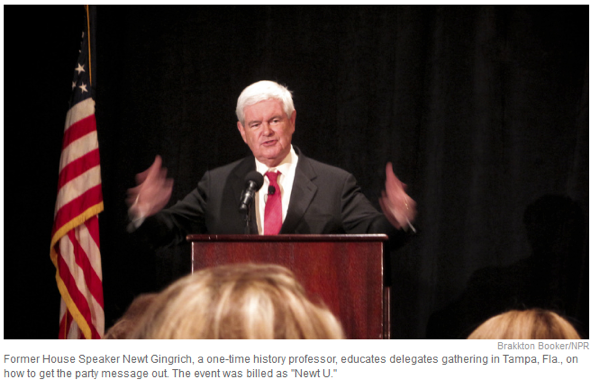Notes
Ann Romney With the Sound Off
God knows I was hoping to like at least one of the Romneys. And, with the acrid tone of Nikki Haley’s speech combined with the agressive, self-serving and ideologically vacant quality of Chris Christie’s, what a wonderful thing that Ann Romney appeared last night to talk about love. But then, isn’t love something you share?
She got off to a good start also, laughing and joking and addressing women in the convention hall in such an intimate way. But it was pretty clear that, as she ticked off some enticing biographical facts about her father, what was was already off was the fact that everything else was generic and rather sterile. And I’m not saying that Ann Romney isn’t the most insightful and compassionate person in the world, just like her kids claim she is and she claims her husband is. But then, in the way she failed to explain Mitt to us in any individualistic way, this being the most important opportunity she had to share him with the world, how were we supposed to know?
Sadly, what we got with Ann Romney last night was mostly a facsimile of Mitt. As is so characteristic of her husband, what we heard from Ann, especially in segueing from “me,” to “we” and then “he,” were declarative statements without explanation or example. So Mitt is the most caring person we could ever meet. He’s someone who is always available and there for others (with members of their church community, it sounded like). But Ann Romney didn’t offer a single anecdote, not a single example. It’s not that Ann isn’t aware she frustrating us, however, attributing the blank slate to faith then chalking up the reservation to virtue.
Mitt doesn’t like to talk about how he has helped others because he sees it as a privilege, not a political talking point. And we’re no different than the millions of Americans who quietly help their neighbors, their churches and their communities. They don’t do it so that others will think more of them.
They do it because there is no greater joy.
“Give and it shall be given unto you.”
If you’re going to be ascetic, fine. But she brings up love, and there is no music. In it’s place, even while emphasizing that theirs has not been a storybook life, we get the repeated fantasy description (and by now, the awkward placeholder for the biographical talking point) of the hardworking boy she met at the high school dance. Like Mitt, she doesn’t paint any real picture. She doesn’t share any relatable experience. As with Mitt, there is no public evidence of opening oneself up, no letting people hear and then come to their own conclusions — which, the way I understand it, is what love is often about.
Instead, and this is where the body language came in, Ann insisted that, whatever she understands about her husband, and their real life, and their real marriage is just something the American public has to take her word on. It was in that second half of the speech (where these 16 slides, taken in succession, are drawn from) that the defensiveness and the finger wagging came into play, Ann justifying their success and their material gain (although nobody brought it up in the first place) while insisting that Mitt will lift up America, that Mitt will not let us down.
Of course, I recognize looking at Ann this hard can’t help but produce some cognitive dissonance. As the mother of five who had been attacked in the campaign for not working; as someone with MS; as a survivor of breast cancer (which, even after the speech, are facts we still only know from the bio sheets), really how much heart does anybody have in deconstructing Ann when there’s plenty to consider about the nature of Mitt? Still, as Karl Rove said and I’ve never forgotten, “politics is television with the sound off.” And as someone who not only presented herself as a witness to Mitt’s character, but audaciously insisted on plying us with the fairytale at the same time she demanded to be seen for her “real marriage,” Ann’s trapped between reality and the storybook, and she knows it.
Speech transcript and video.
(screen shots via C-SPAN)



Reactions
Comments Powered by Disqus